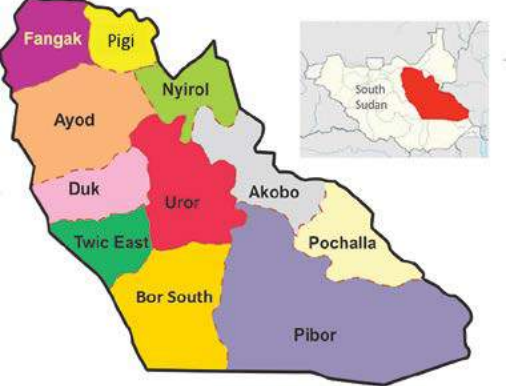More than three weeks after deadly inter-communal clashes erupted in Jonglei State’s Twic East County, authorities have confirmed that the suspected culprits remain at large and no new security forces have been deployed to the conflict zone.
The violence, which took place in the first week of June, involved an attack by armed youth, allegedly from the Hol community of Duk County, on Buothagany, a fishing island inhabited by members of the Ayual Community of Twic East County.
The attack left at least 13 people dead and more than 20 others wounded, according to local authorities.
Jonglei State Police Commissioner Maj. Gen. John Baak told this publication that the situation on the ground remains tense.
“There is no one arrested yet, and up to now, there is no update in the area,” he said. “It is only the local police who were already there that are still there.”
Twic East County Commissioner Juach Arok confirmed that the displaced Ayual residents have yet to return home, and the contested territory remains under the control of armed groups from Duk County.
“Our people were displaced on the 4 June, and the area is still under the control of Duk County and their allies,” Arok said. “Those who were missing are still missing. We have not confirmed whether they are dead or alive.”
Meanwhile, Jonglei State Minister of Law Enforcement Simon Hoth cited logistical constraints as the reason for the government’s failure to deploy security forces.
The attack is widely believed to be a retaliatory strike linked to unresolved grievances, notably the October 2023 killing of Deng Dau, commonly known as Deng-Moradong, a prominent wrestler. His death, allegedly at the hands of youth from Duk County, remains a flashpoint in inter-communal conflicts.
The state’s inability to arrest those responsible has drawn criticism. There is a perception that the Jonglei State government has relaxed its efforts to arrest suspects, particularly after members of the Hol Community broke into Bor Central Prison in July 2024 and freed individuals arrested for their roles in previous clashes. Their actions were driven by the belief that the state government had failed to arrest suspects from the Ayual Community.
For his part, Bol Deng Bol, Executive Director of the Bor-based advocacy group INTREPID South Sudan and chairperson of the Jonglei Civil Society Network, urged the government to intervene and decisively address the prolonged Duk-Twic East conflict.
“Government is the only mediator that is viable now to settle this situation, because we never know, in the next few minutes, in the next month, the same thing will happen. There will be attacks, communal attacks,” he said. “As we speak, intercommunal and inter-communal violence and conflicts in Jonglei State have spiked in the last few months. This is because there are no tangible and impactful efforts put in place to resolve the conflicts over time.”
Communal conflicts continue to plague Jonglei State and other regions of South Sudan, driven by a volatile mix of ethnic divisions, competition over resources, impunity, and weak state institutions. Analysts warn that unless meaningful action is taken, the cycle of violence could worsen, endangering civilian lives and undermining peace-building efforts.




